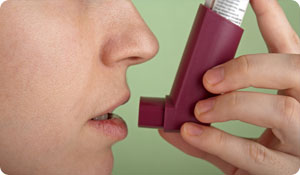
You know all too well the telltale wheeze that occurs with asthma. Sometimes, your asthma can worsen without a warning and you may suddenly become aware that you're wheezing. Often, wheezing will be accompanied by coughing, a feeling of pressure on your chest, and difficulty breathing.
How to Treat an Asthma Wheeze
When you notice yourself wheezing, your asthma action plan will direct you to use your fast-acting relief inhaler. This usually helps to open up your airways so that air can move in and out of your lungs more easily.
In some cases, though, the first inhaler use won't be enough to reverse the problem. Always check with your doctor up front to find out how to respond if the wheezing continues. In some cases, it's appropriate to take another dose of the inhaler or to use a nebulizer to help you get more medication into your lungs. But if your symptoms are worsening, it may be time to seek emergency medical care.
Treating an Asthma Wheeze at Home
If you plan to treat mild wheezing at home, try turning your shower on hot to let the bathroom steam up so you can breathe in the moist air. This can help open your airways and provide quick relief. A vaporizer can also bring similar benefits.
For a persistent wheeze, especially one that's accompanied by other asthma symptoms, you may need to use an asthma control medication, such as a corticosteroid, to help reduce airway inflammation over the long-term. Some people may also need to take an oral steroid for a short time to help relieve more serious symptoms.
Managing Asthma and Wheezing
To prevent an asthma wheeze before it begins, it can be helpful to identify what actually triggers the problem so you can make an effort to avoid them. Seasonal allergies, scented products, and chemicals can all be common factors that can lead to wheezing. Many people also experience wheezing with asthma when they exercise. If this happens to you, your doctor may suggest you use your fast-acting relief inhaler before you hit the gym.
Remember that everyone is different and only your doctor can tell you what will be the best way to treat asthma wheezing in your specific situation.
Sources:
Li, James T. "Is it possible to have asthma without wheezing?" Mayo Clinic. Mayo Foundation for Medical Education and Research, 19 March 2010. Web. 16 June 2011.
"Monitoring Symptoms." American Lung Association. LungUSA.org, n.d. Web, 17 June 2011.
"What are the Signs and Symptoms of Asthma?" National Heart, Lung, and Blood Institute. National Library of Medicine/National Institutes of Health, 21 Feb. 2010. Web. 16 June 2011.
"Wheezing." Medline Plus. National Library of Medicine/National Institutes of Health, 3 June 2011. Web. 15 June 2011.





